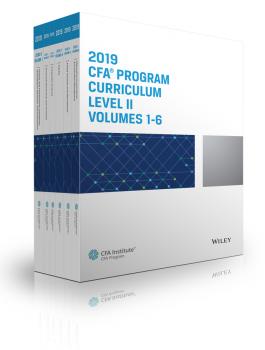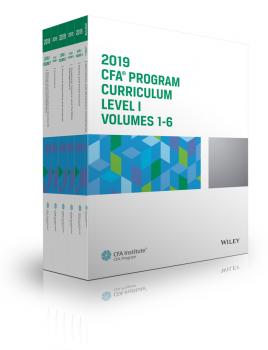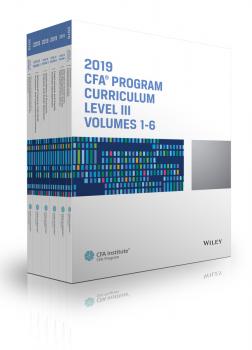CFA Institute
Список книг автора CFA InstituteCFA Program Curriculum 2018 Level II
Master the practical aspects of the CFA Program Curriculum with expert instruction for the 2018 exam The same official curricula that CFA Program candidates receive with program registration is now publicly available for purchase. CFA Program Curriculum 2018 Level II, Volumes 1-6 provides the complete Level II Curriculum for the 2018 exam, with practical instruction on the Candidate Body of Knowledge (CBOK) and how it is applied, including expert guidance on incorporating concepts into practice. Level II focuses on complex analysis with an emphasis on asset valuation, and is designed to help you use investment concepts appropriately in situations analysts commonly face. Coverage includes ethical and professional standards, quantitative analysis, economics, financial reporting and analysis, corporate finance, equities, fixed income, derivatives, alternative investments, and portfolio management organized into individual study sessions with clearly defined Learning Outcome Statements. Charts, graphs, figures, diagrams, and financial statements illustrate complex concepts to facilitate retention, and practice questions with answers allow you to gauge your understanding while reinforcing important concepts. While Level I introduced you to basic foundational investment skills, Level II requires more complex techniques and a strong grasp of valuation methods. This set dives deep into practical application, explaining complex topics to help you understand and retain critical concepts and processes. Incorporate analysis skills into case evaluations Master complex calculations and quantitative techniques Understand the international standards used for valuation and analysis Gauge your skills and understanding against each Learning Outcome Statement CFA Institute promotes the highest standards of ethics, education, and professional excellence among investment professionals. The CFA Program Curriculum guides you through the breadth of knowledge required to uphold these standards. The three levels of the program build on each other. Level I provides foundational knowledge and teaches the use of investment tools; Level II focuses on application of concepts and analysis, particularly in the valuation of assets; and Level III builds toward synthesis across topics with an emphasis on portfolio management.
CFA Program Curriculum 2019 Level II Volumes 1-6 Box Set
Master the practical aspects of the CFA Program curriculum with expert instruction for the 2019 exam The same official curricula that CFA Program candidates receive with program registration is now publicly available for purchase. CFA Program Curriculum 2019 Level II, Volumes 1-6 provides the complete Level II curriculum for the 2019 exam, with practical instruction on the Candidate Body of Knowledge (CBOK) and how it is applied, including expert guidance on incorporating concepts into practice. Level II focuses on complex analysis with an emphasis on asset valuation, and is designed to help you use investment concepts appropriately in situations analysts commonly face. Coverage includes ethical and professional standards, quantitative analysis, economics, financial reporting and analysis, corporate finance, equities, fixed income, derivatives, alternative investments, and portfolio management organized into individual study sessions with clearly defined Learning Outcome Statements. Charts, graphs, figures, diagrams, and financial statements illustrate complex concepts to facilitate retention, and practice questions with answers allow you to gauge your understanding while reinforcing important concepts. While Level I introduced you to basic foundational investment skills, Level II requires more complex techniques and a strong grasp of valuation methods. This set dives deep into practical application, explaining complex topics to help you understand and retain critical concepts and processes. Incorporate analysis skills into case evaluations Master complex calculations and quantitative techniques Understand the international standards used for valuation and analysis Gauge your skills and understanding against each Learning Outcome Statement CFA Institute promotes the highest standards of ethics, education, and professional excellence among investment professionals. The CFA Program curriculum guides you through the breadth of knowledge required to uphold these standards. The three levels of the program build on each other. Level I provides foundational knowledge and teaches the use of investment tools; Level II focuses on application of concepts and analysis, particularly in the valuation of assets; and Level III builds toward synthesis across topics with an emphasis on portfolio management.
CFA Program Curriculum 2019 Level I Volumes 1-6 Box Set
Clear, concise instruction for all CFA Program Level I concepts and competencies for the 2019 exam The same official curricula that CFA Program candidates receive with program registration is now publicly available for purchase. CFA Program Curriculum 2019 Level I, Volumes 1-6 provides the complete Level I curriculum for the 2019 exam, delivering the Candidate Body of Knowledge (CBOK) with expert instruction on all 10 topic areas of the CFA Program. Fundamental concepts are explained in-depth with a heavily visual style, while cases and examples demonstrate how concepts apply in real-world scenarios. Coverage includes ethical and professional standards, quantitative analysis, economics, financial reporting and analysis, corporate finance, equities, fixed income, derivatives, alternative investments, and portfolio management, all organized into individual sessions with clearly defined Learning Outcome Statements. Charts, graphs, figures, diagrams, and financial statements illustrate concepts to facilitate retention, and practice questions provide the opportunity to gauge your understanding while reinforcing important concepts. Learning Outcome Statement checklists guide readers to important concepts to derive from the readings Embedded case studies and examples throughout demonstrate practical application of concepts Figures, diagrams, and additional commentary make difficult concepts accessible Practice problems support learning and retention CFA Institute promotes the highest standards of ethics, education, and professional excellence among investment professionals. The CFA Program curriculum guides you through the breadth of knowledge required to uphold these standards.
CFA Program Curriculum 2019 Level III Volumes 1-6 Box Set
Apply CFA Program concepts and skills to real-world wealth and portfolio management for the 2019 exam The same official curricula that CFA Program candidates receive with program registration is now publicly available for purchase. CFA Program Curriculum 2019 Level III, Volumes 1-6 provides complete, authoritative guidance on synthesizing the entire CFA Program Candidate Body of Knowledge (CBOK) into professional practice for the 2019 exam. This book helps you bring together the skills and concepts from Levels I and II to formulate a detailed, professional response to a variety of real-world scenarios. Coverage spans all CFA Program topics and provides a rigorous treatment of portfolio management, all organized into individual study sessions with clearly defined Learning Outcome Statements. Visual aids clarify complex concepts, and practice questions allow you to test your understanding while reinforcing major content areas. Levels I and II equipped you with foundational investment tools and complex analysis skill; now, you'll learn how to effectively synthesize that knowledge to facilitate effective portfolio management and wealth planning. This study set helps you convert your understanding into a professional body of knowledge that will benefit your clients' financial futures. Master essential portfolio management and compliance topics Synthesize your understanding into professional guidance Reinforce your grasp of complex analysis and valuation Apply ethical and professional standards in the context of real-world cases CFA Institute promotes the highest standards of ethics, education, and professional excellence among investment professionals. The CFA Program curriculum guides you through the breadth of knowledge required to uphold these standards. The three levels of the program build on each other. Level I provides foundational knowledge and teaches the use of investment tools; Level II focuses on application of concepts and analysis, particularly in the valuation of assets; and Level III builds toward synthesis across topics with an emphasis on portfolio management.
CFA Program Curriculum 2018 Level III
Apply CFA Program concepts and skills to real-world wealth and portfolio management for the 2018 exam The same official curricula that CFA Program candidates receive with program registration is now publicly available for purchase. CFA Program Curriculum 2018 Level III, Volumes 1-6 provides complete, authoritative guidance on synthesizing the entire CFA Program Candidate Body of Knowledge (CBOK) into professional practice for the 2018 exam. This book helps you bring together the skills and concepts from Levels I and II to formulate a detailed, professional response to a variety of real-world scenarios. Coverage spans all CFA Program topics and provides a rigorous treatment of portfolio management, all organized into individual study sessions with clearly defined Learning Outcome Statements. Visual aids clarify complex concepts, and practice questions allow you to test your understanding while reinforcing major content areas. Levels I and II equipped you with foundational investment tools and complex analysis skill; now, you'll learn how to effectively synthesize that knowledge to facilitate effective portfolio management and wealth planning. This study set helps you convert your understanding into a professional body of knowledge that will benefit your clients' financial futures. Master essential portfolio management and compliance topics Synthesize your understanding into professional guidance Reinforce your grasp of complex analysis and valuation Apply ethical and professional standards in the context of real-world cases CFA Institute promotes the highest standards of ethics, education, and professional excellence among investment professionals. The CFA Program Curriculum guides you through the breadth of knowledge required to uphold these standards. The three levels of the program build on each other. Level I provides foundational knowledge and teaches the use of investment tools; Level II focuses on application of concepts and analysis, particularly in the valuation of assets; and Level III builds toward synthesis across topics with an emphasis on portfolio management.
CFA Program Curriculum 2018 Level I
Clear, concise instruction for all CFA Level I concepts and competencies for the 2018 exam The same official curricula that CFA Program candidates receive with program registration is now publicly available for purchase. CFA Program Curriculum 2018 Level I, Volumes 1-6 provides the complete Level I Curriculum for the 2018 exam, delivering the Candidate Body of Knowledge (CBOK) with expert instruction on all 10 topic areas of the CFA Program. Fundamental concepts are explained in-depth with a heavily visual style, while cases and examples demonstrate how concepts apply in real-world scenarios. Coverage includes ethical and professional standards, quantitative analysis, economics, financial reporting and analysis, corporate finance, equities, fixed income, derivatives, alternative investments, and portfolio management, all organized into individual sessions with clearly defined Learning Outcome Statements. Charts, graphs, figures, diagrams, and financial statements illustrate concepts to facilitate retention, and practice questions provide the opportunity to gauge your understanding while reinforcing important concepts. Learning Outcome Statement checklists guide readers to important concepts to derive from the readings Embedded case studies and examples throughout demonstrate practical application of concepts Figures, diagrams, and additional commentary make difficult concepts accessible Practice problems support learning and retention CFA Institute promotes the highest standards of ethics, education, and professional excellence among investment professionals. The CFA Program Curriculum guides you through the breadth of knowledge required to uphold these standards.The three levels of the program build on each other. Level I provides foundational knowledge and teaches the use of investment tools; Level II focuses on application of concepts and analysis, particularly in the valuation of assets; and Level III builds toward synthesis across topics with an emphasis on portfolio management.





